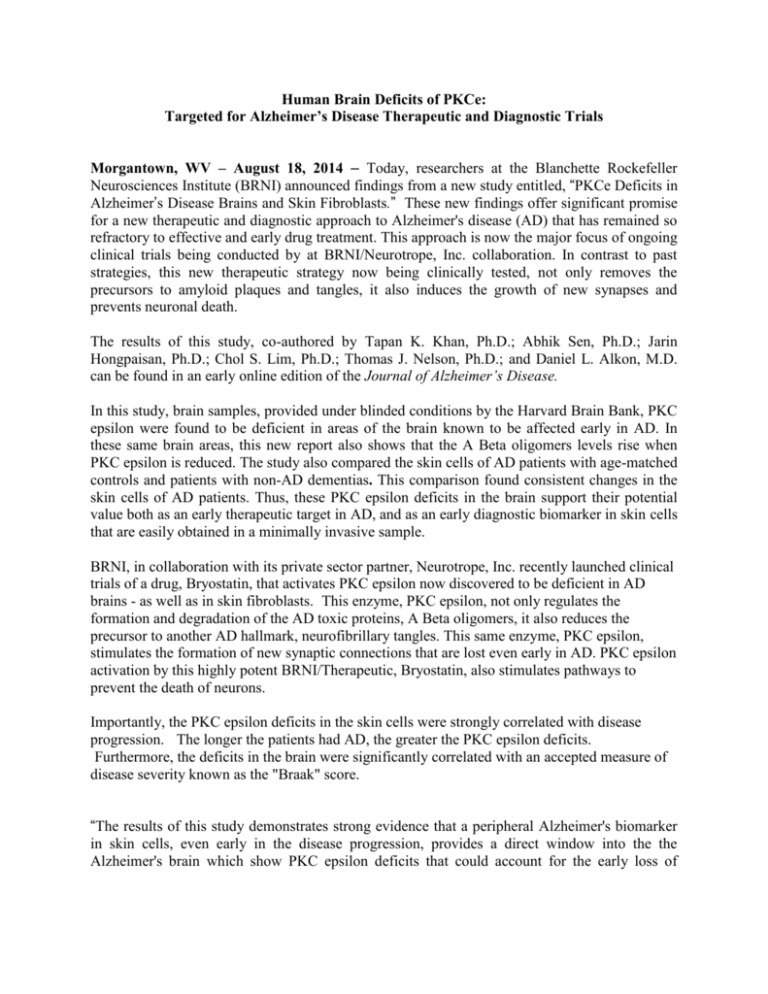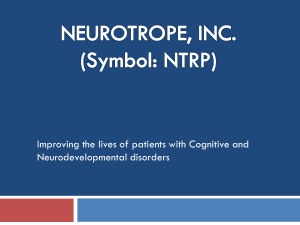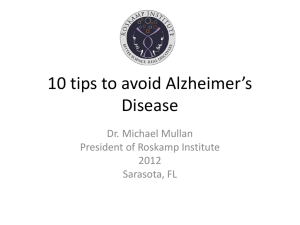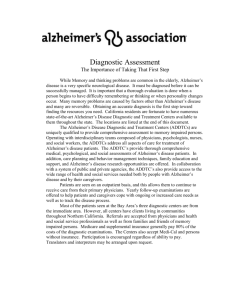BRNI_Release_-_JAD_Final
advertisement

Human Brain Deficits of PKCe: Targeted for Alzheimer’s Disease Therapeutic and Diagnostic Trials Morgantown, WV – August 18, 2014 – Today, researchers at the Blanchette Rockefeller Neurosciences Institute (BRNI) announced findings from a new study entitled, “PKCe Deficits in Alzheimer’s Disease Brains and Skin Fibroblasts.” These new findings offer significant promise for a new therapeutic and diagnostic approach to Alzheimer's disease (AD) that has remained so refractory to effective and early drug treatment. This approach is now the major focus of ongoing clinical trials being conducted by at BRNI/Neurotrope, Inc. collaboration. In contrast to past strategies, this new therapeutic strategy now being clinically tested, not only removes the precursors to amyloid plaques and tangles, it also induces the growth of new synapses and prevents neuronal death. The results of this study, co-authored by Tapan K. Khan, Ph.D.; Abhik Sen, Ph.D.; Jarin Hongpaisan, Ph.D.; Chol S. Lim, Ph.D.; Thomas J. Nelson, Ph.D.; and Daniel L. Alkon, M.D. can be found in an early online edition of the Journal of Alzheimer’s Disease. In this study, brain samples, provided under blinded conditions by the Harvard Brain Bank, PKC epsilon were found to be deficient in areas of the brain known to be affected early in AD. In these same brain areas, this new report also shows that the A Beta oligomers levels rise when PKC epsilon is reduced. The study also compared the skin cells of AD patients with age-matched controls and patients with non-AD dementias. This comparison found consistent changes in the skin cells of AD patients. Thus, these PKC epsilon deficits in the brain support their potential value both as an early therapeutic target in AD, and as an early diagnostic biomarker in skin cells that are easily obtained in a minimally invasive sample. BRNI, in collaboration with its private sector partner, Neurotrope, Inc. recently launched clinical trials of a drug, Bryostatin, that activates PKC epsilon now discovered to be deficient in AD brains - as well as in skin fibroblasts. This enzyme, PKC epsilon, not only regulates the formation and degradation of the AD toxic proteins, A Beta oligomers, it also reduces the precursor to another AD hallmark, neurofibrillary tangles. This same enzyme, PKC epsilon, stimulates the formation of new synaptic connections that are lost even early in AD. PKC epsilon activation by this highly potent BRNI/Therapeutic, Bryostatin, also stimulates pathways to prevent the death of neurons. Importantly, the PKC epsilon deficits in the skin cells were strongly correlated with disease progression. The longer the patients had AD, the greater the PKC epsilon deficits. Furthermore, the deficits in the brain were significantly correlated with an accepted measure of disease severity known as the "Braak" score. “The results of this study demonstrates strong evidence that a peripheral Alzheimer's biomarker in skin cells, even early in the disease progression, provides a direct window into the the Alzheimer's brain which show PKC epsilon deficits that could account for the early loss of synaptic connections and dementia," says Dr. Alkon, Scientific Director of the Blanchette Rockefeller Neurosciences Institute, and Chief Scientific Officer of Neurotrope, Inc. About the Blanchette Rockefeller Neurosciences Institute The Blanchette Rockefeller Neurosciences Institute (BRNI) is a unique, independent, non-profit institute dedicated to the study of memory and finding solutions to memory disorders. BRNI was founded in 1999 in memory of Blanchette Ferry Hooker Rockefeller, an Alzheimer's patient and mother of U. S. Senator John D. Rockefeller IV. BRNI is operated in alliance with West Virginia University as well as in collaboration with other academic institutions. About Neurotrope Neurotrope was formed in October 2012 principally to license, develop and commercialize various novel therapeutic and diagnostic technologies from BRNI. Neurotrope’s pipeline, under its license from BRNI, includes the drug candidate, bryostatin, for the treatment of Alzheimer’s disease; a minimally invasive, diagnostic biomarker analysis system which would assess the presence of Alzheimer’s in patients. A Phase 2a study with bryostatin in the treatment of Alzheimer’s disease is currently underway. In addition, Neurotrope has a world-wide, exclusive license agreement with the Icahn School of Medicine at Mount Sinai to utilize its proprietary information and data package for the use of Bryostatin-1 in the treatment of Niemann-Pick Type C Disease, a rare disease, mostly of children who are afflicted with Alzheimer-like symptoms. Also, as part of its license from BRNI, the Company, under its BRNI license, the rights to pursue treatments for a number of orphan diseases, including Fragile X Syndrome. The Company’s preclinical and clinical efforts are focused on the development of conventional small molecules that are extraordinarily potent in the activation of the enzyme PKCe, which has been shown to play a central role in the regrowth or repair of nervous tissues, cells or cell products. About Bryostatin Bryostatin is a natural product produced by a marine invertebrate organism called Bugula neritina and is isolated from organic matter harvested from the ocean. Several variations of this complex product have been achieved in recent years in various academic chemistry laboratories, including bryostatin derivatives being developed through an exclusive license with Stanford University and the existing license agreement with BRNI. These approaches may represent alternative sources of drug supply. For additional information, please contact: Karen Shuler Stakem 304-218-8354 kss@thegoodwingroup.com ###











